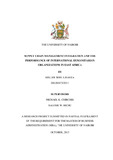| dc.contributor.author | Lisanza, Keller S | |
| dc.date.accessioned | 2013-11-13T09:45:58Z | |
| dc.date.available | 2013-11-13T09:45:58Z | |
| dc.date.issued | 2013-10 | |
| dc.identifier.citation | Lisanza,Keller S.;October,2013.Supply Chain Management Integration And The Performance Of International Humanitarian Organizations In East Africa. | en |
| dc.identifier.uri | http://erepository.uonbi.ac.ke:8080/xmlui/handle/123456789/58868 | |
| dc.description.abstract | A research study to establish the relationship that exists between SCM integration and the
performance of international humanitarian organizations in East Africa was carried out.
The study had three key objectives; to determine the extent of SCM integration; the
relationship between SCM integration and the performance of humanitarian
organizations; and to determine the challenges of SCM integration in humanitarian
organizations in East Africa. The research design involved a cross sectional survey of all
international humanitarian organizations in East Africa. Data was collected using a
questionnaire that was administered through on-line method. Percentages and frequencies
were used to analyze objective one and three, whereas regression analysis was used to
analyze the relationship between SCM integration and organizational performance. The
findings were presented in tables and pie charts and the study established that most of the
international humanitarian organizations in East Africa have integrated their SCM
functions. It was also clear that there was a very significant relationship between SCM
integration and organizational performance represented by the R2 value of 0.789 which
translates to 78.9% variance as explained by the four independent variables of Joint
planning; IT and ERP Tools; Functional coordination and SCM activities reporting into
one functional unit. It is recommended that all humanitarian organizations and other
entities should embrace the concept of SCM integration so that they can reap its benefits.
The concept, among other benefits, will lead to faster and efficient goods, works and
services to the beneficiary. Even though the study was completed in within the required
time, it was an uphill task for the researcher to convince the respondents to participate in
the study in good time. Further research on the same study can be done in other regions to
establish whether SCM integration is able to yield the same effect on international
humanitarian organizational performance. | en |
| dc.language.iso | en | en |
| dc.publisher | University of Nairobi | en |
| dc.title | Supply chain management integration and the performance of international humanitarian organizations in East Africa | en |
| dc.type | Thesis | en |
| local.publisher | College of Humanities and Social Sciences | en |

